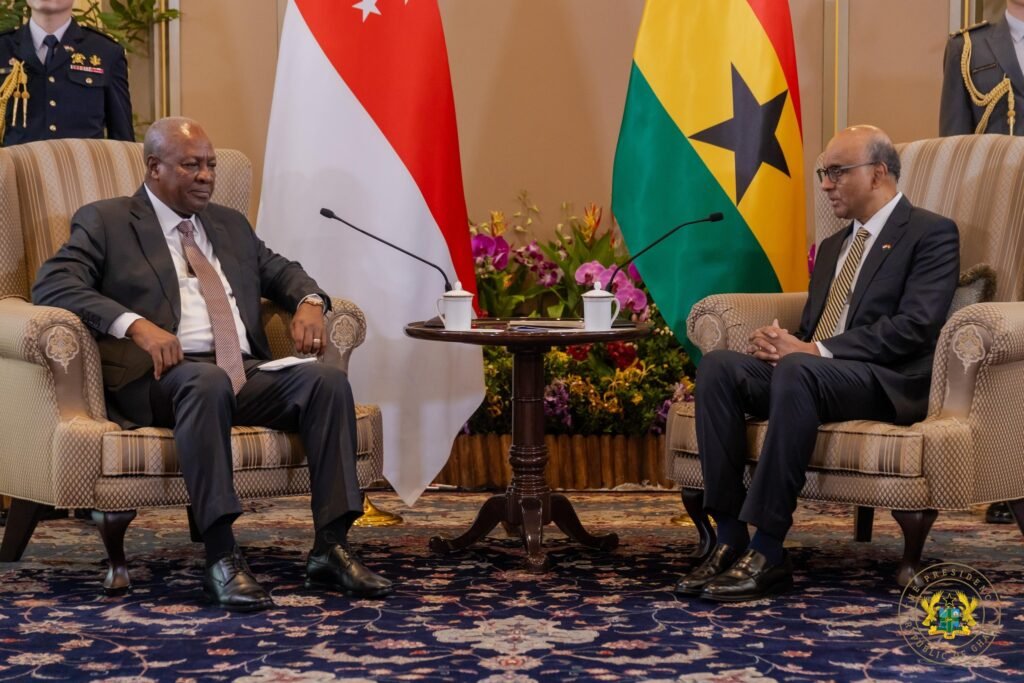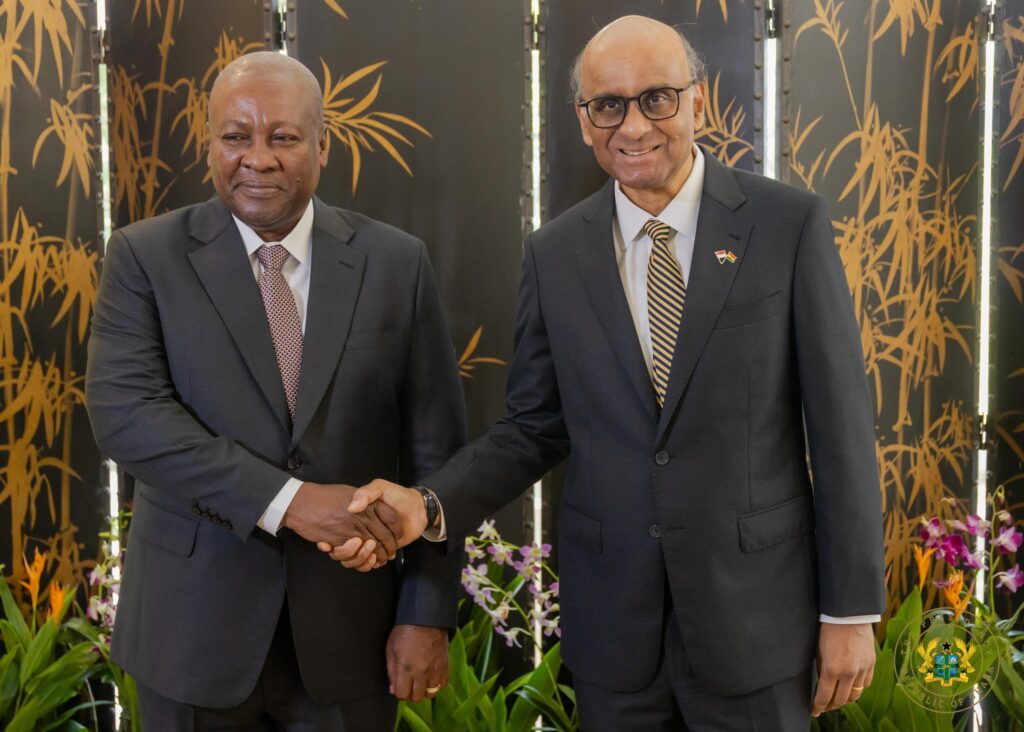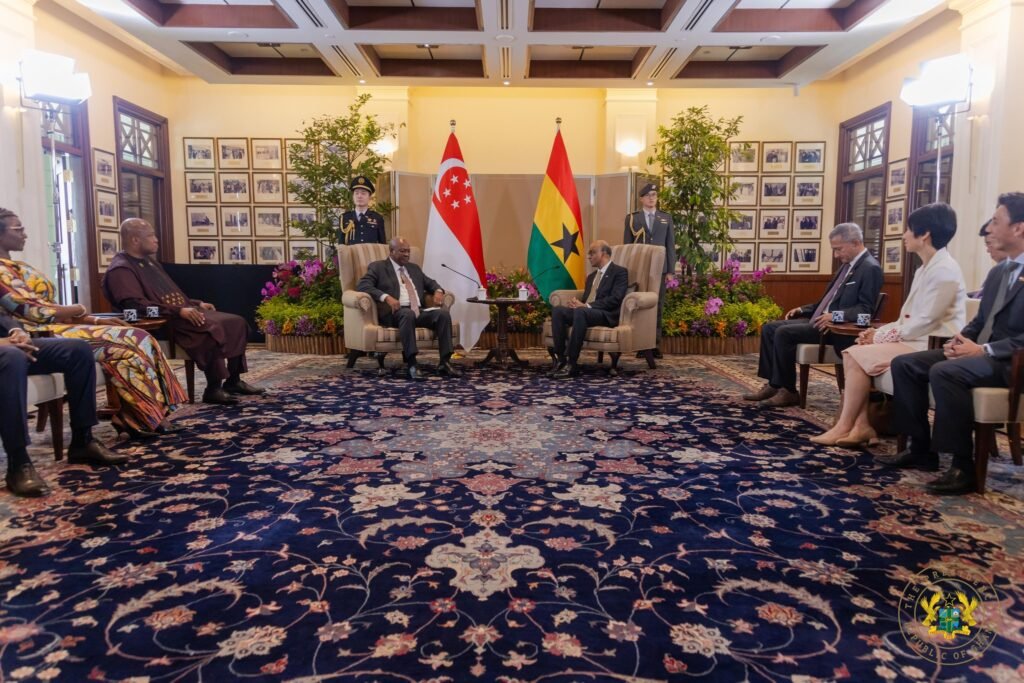President John Dramani Mahama has once again reaffirmed his adherence to Ghana’s two-term presidential limit, stressing that his absence from the 2028 ballot will give him the credibility and independence to enforce fiscal discipline ahead of the next general elections.
Speaking during a bilateral meeting with Singaporean President Tharman Shanmugaratnam on his three-day state visit, President Mahama decried the entrenched culture of election-year overspending, which has historically undermined the country’s macroeconomic stability.
He said the decision to stay away from the 2028 polls will strengthen his hand in resisting the temptation of election-related fiscal excesses.
“I will not be a candidate in the next elections and therefore I can hold the line when it comes to fiscal discipline,” President Mahama emphasized, underscoring his determination to break the cycle of economic instability that typically accompanies election seasons.
President Mahama pointed to the track record of successive governments that often bend fiscal rules to curry favour with voters, a practice that has worsened Ghana’s debt profile and triggered repeated economic downturns.
He maintained that with his constitutionally mandated final term secured, his administration is uniquely placed to reverse that trend and build a stronger foundation of macroeconomic prudence.

The President’s remarks directly challenge persistent claims by members of the opposition New Patriotic Party (NPP), who have suggested that Mahama harbours ambitions to seek a third term after his current mandate.
These allegations, which have circulated widely in political discourse, have been dismissed by President Mahama’s party as unfounded.
NDC’s Confirmation
National Democratic Congress (NDC) National Chairman Johnson Asiedu Nketiah has in latest remarks pushed back strongly against such claims, stressing that the party has no intention of breaching Ghana’s constitutional provisions.
Responding to suggestions that President Mahama may be put on the ballot again in 2028, Asiedu Nketiah categorically denounced it.
“No, please. We have never run our party in ways that conflict with the national constitution. And we don’t intend to do that. We will stick by the tenets of the 1992 Constitution.”
National Democratic Congress (NDC) National Chairman Johnson Asiedu Nketiah
President Mahama’s latest assurances come as his administration touts significant macroeconomic gains since his return to office following a landslide victory in the 2024 elections.
He cited sharp declines in inflation and interest rates, alongside a strong appreciation of the cedi, as evidence of progress under his leadership. These achievements, he argued, show that his government is on course to restore stability and lay the groundwork for sustainable growth.

The bilateral talks with Singaporean President Shanmugaratnam also focused on strengthening economic cooperation and deepening investment ties between the two countries.
Singapore, with its globally recognized record of disciplined economic management and efficient governance, provides a useful partner for Ghana as Mahama seeks to entrench reforms in public financial administration.
President Mahama’s emphasis on fiscal discipline and his explicit rejection of a third-term bid appear designed not only to reassure international partners but also to build public confidence in his government’s economic programme.
With Ghana still recovering from years of fiscal slippages and debt accumulation, the president’s stance could signal a decisive shift in managing the nation’s finances.

President Mahama’s determination to respect the two-term presidential limit is critical for Ghana’s democratic consolidation. The 1992 Constitution has long been regarded as a bulwark against executive overreach, and any move to extend presidential tenure beyond the two-term cap would likely provoke significant political resistance.
By ruling out any such ambitions, President Mahama is positioning himself as a custodian of constitutional order while strengthening his administration’s legitimacy in enforcing tough but necessary fiscal reforms.
READ ALSO: Africa’s Energy Transition at Risk as Fossil Fuels Dominate Investment Flows – NRGI























